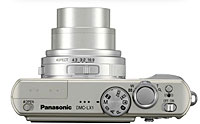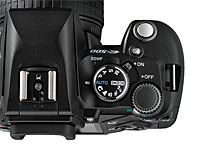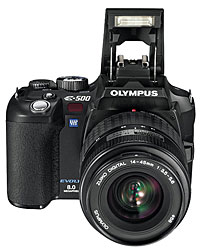 Bibs were hastily donned to soak up the undignified rivers of drooling dribble that appeared in the office when Panasonic first announced the latest addition to their high quality Lumix digital camera range, the LX1, back in July.
Bibs were hastily donned to soak up the undignified rivers of drooling dribble that appeared in the office when Panasonic first announced the latest addition to their high quality Lumix digital camera range, the LX1, back in July.
It wasn’t just the stunning looks, manual control, image stabilisation and crisp wide-angle 4X Leica zoom lens that set our saliva organs into ungainly overdrive – we loved the fact that this was the first camera to feature a 16:9 aspect ratio, using the full 8.4-megapixel sensor.
The 16:9 aspect ratio closely approximates the natural wide field of view of the human eye meaning its dimensions will fill a widescreen TV perfectly.
 The camera can also shoot in 3:2 and the more conventional 4:3 aspect ratio, with a switch on the lens barrel making it easy to switch to the format best suited for the composition on a shot-by-shot basis.
The camera can also shoot in 3:2 and the more conventional 4:3 aspect ratio, with a switch on the lens barrel making it easy to switch to the format best suited for the composition on a shot-by-shot basis.
Boasting an impressively wide zoom range of 28 mm to 112 mm (35mm equiv), the LEICA DC VARIO-ELMARIT lens should prove ideal for indoor photography, architectural and landscape shots.
Recovering alcoholics and compulsive wobblers will love the optical stabilization system (OIS) that does a great job of steadying the camera at slow shutter speeds and producing sharp images where other cameras would fail.
 It’s no mean feat to fit an effective stabilisation system into a 4.2 by 2.2 by 1.4 inches camera, and users should find it an invaluable feature for low light photography – small cameras can be notoriously hard to hold steady at slow shutter speeds.
It’s no mean feat to fit an effective stabilisation system into a 4.2 by 2.2 by 1.4 inches camera, and users should find it an invaluable feature for low light photography – small cameras can be notoriously hard to hold steady at slow shutter speeds.
As well as a comprehensive selection of 14 scene modes, there’s manual controls offering a choice of apertures between f/2.8 and f/8 (adjustable in 1/3-stop increments) at the wide-angle position and f/4.9 to f/8 at the telephoto end.
Shutter speeds can be selected from 8 seconds to 1/2,000 second (60 seconds to 1/2,000 second in manual mode).
 Sensitivity can be set to ISO 80, 100, 200, or 400, with the built in pop-up flash offering coverage up to 13.1 feet in wide-angle mode and 7.5 feet at the telephoto position.
Sensitivity can be set to ISO 80, 100, 200, or 400, with the built in pop-up flash offering coverage up to 13.1 feet in wide-angle mode and 7.5 feet at the telephoto position.
Photo enthusiasts will appreciate the manual focus feature which uses a joystick to fine-tune focus on an enlarged portion of the image, with the same joystick being used to change shutter speed and aperture in manual or shutter/aperture priority mode.
In line with its high end aspirations, images can be saved in JPEG (choice of two compression ratios), TIFF and raw file formats.
 The Leica lens can focus down to two inches in macro modem with focus switchable from spot to single-point, three-point, or nine-point autofocus zones.
The Leica lens can focus down to two inches in macro modem with focus switchable from spot to single-point, three-point, or nine-point autofocus zones.
For manual and automatic shooting, there’s evaluative, centre-weighted and spot metering available.
Wannabe Spielberg’s will be tempted by the camera’s particularly impressive movie mode, offering an astonishing ultra-high-quality 16:19 Wide VGA film-clip capability, capturing 848×480 sound movies at a smooth 30fps.
Sadly, there’s no optical viewfinder on offer, so all framing and viewing of images – and camera fine tuning – is taken care of via the a sharp and bright 207k 2.5-inch LCD on the back panel.
 In shooting mode, this presents a wealth of optional information including a handy alignment grid dividing the screen into vertical and horizontal thirds.
In shooting mode, this presents a wealth of optional information including a handy alignment grid dividing the screen into vertical and horizontal thirds.
With its beautiful looks, enthusiast pleasing feature set, world’s first 16:9 aspect ratio and pin-sharp Leica lens, Panasonic look to be on to an absolute winner here – but where is the thing?
Apart from a few, quickly scooped-up, silver versions of the camera appearing online and in central London, most stores are reporting that they are “awaiting stock”, with no news of the drop-dead gorgeous black version that we’re keen to get our paws on.
A few reviews have cropped up on the web – usually in strange languages – with the excellent DPreview.com offering some pre-production samples that looked mighty fine to our eyes
Worryingly, a promised review on dcresource.com has been “delayed due to technical difficulties” – or, as the author explains elsewhere – because the camera “kicked the bucket.”
We hope that that these problems are just pre-production glitches because we’ve rarely seen such a tempting looking camera.
As soon as we get our hands on one, we’ll have a review for you. Soon, we hope!
Lumix LX1
 T-Mobile have launched ‘Web’n’walk’, their mass-market mobile Internet service, and are confidently predicting that it expects to lure hundreds of thousands of customers onto the service over the next couple of years.
T-Mobile have launched ‘Web’n’walk’, their mass-market mobile Internet service, and are confidently predicting that it expects to lure hundreds of thousands of customers onto the service over the next couple of years. Conceding that Internet services on mobile devices to date had so far been, well, rubbish, McBride bigged up T-Mobile’s approach for fast, simple and affordable services and products, saying that mobile networks will eventually carry more Internet traffic than fixed-line computers or phones.
Conceding that Internet services on mobile devices to date had so far been, well, rubbish, McBride bigged up T-Mobile’s approach for fast, simple and affordable services and products, saying that mobile networks will eventually carry more Internet traffic than fixed-line computers or phones. Olympus have unveiled the SP-700, a new addition to their new SP series of cameras with a special guide function for beginners explaining what button does what.
Olympus have unveiled the SP-700, a new addition to their new SP series of cameras with a special guide function for beginners explaining what button does what. We couldn’t find a preset for ‘pub’ or ‘all night rave in a dingy warehouse’, but there’s an underwater mode included too (just so long as punters remember that they’ve got to slap on the PT-013 underwater case before dunking their expensive camera into the sea).
We couldn’t find a preset for ‘pub’ or ‘all night rave in a dingy warehouse’, but there’s an underwater mode included too (just so long as punters remember that they’ve got to slap on the PT-013 underwater case before dunking their expensive camera into the sea). Olympus is making a big hoo-hah about its ‘Compare and Shoot’ function which lets users check and compare results before re-shooting or adjusting settings if needed.
Olympus is making a big hoo-hah about its ‘Compare and Shoot’ function which lets users check and compare results before re-shooting or adjusting settings if needed. The camera is pitched directly in competition with the
The camera is pitched directly in competition with the  Fashion aficionados concerned that the hue of their laptop may clash awfully with their high fashion clobber will be delighted to learn that Sony is releasing their Sony F-type laptops in four stylish colours.
Fashion aficionados concerned that the hue of their laptop may clash awfully with their high fashion clobber will be delighted to learn that Sony is releasing their Sony F-type laptops in four stylish colours. Carbon Fibre Laptops
Carbon Fibre Laptops The Vaio TX series offer a handy AV mode button which makes the machine available for watching movies or listening to music in just 12 seconds with no need to boot up Windows.
The Vaio TX series offer a handy AV mode button which makes the machine available for watching movies or listening to music in just 12 seconds with no need to boot up Windows. Listen to
Listen to  Politically, presenting in Tokyo was an important act – delivering this radical message in the home town of Sony’s head office.
Politically, presenting in Tokyo was an important act – delivering this radical message in the home town of Sony’s head office. In the nine months that its been on the market, it’s sold 6m units worldwide, making it, they claim, the most successful portable games machine to date.
In the nine months that its been on the market, it’s sold 6m units worldwide, making it, they claim, the most successful portable games machine to date. Sony’s new digital compact camera, the DSC-N1, cunningly attempts to combine the functions of a digital camera with a ‘pocket viewer’.
Sony’s new digital compact camera, the DSC-N1, cunningly attempts to combine the functions of a digital camera with a ‘pocket viewer’. Stored images can be played back individually or as a slideshow, complete with options to add transitions, pans, wipes, fades and zooms, cheesy themes and background music.
Stored images can be played back individually or as a slideshow, complete with options to add transitions, pans, wipes, fades and zooms, cheesy themes and background music. “The combination of these functions makes the N1 ‘more than just a camera’, because it takes sharing to a whole new level.”
“The combination of these functions makes the N1 ‘more than just a camera’, because it takes sharing to a whole new level.” Although the camera can only record stills in JPEG format,
Although the camera can only record stills in JPEG format,  Sony’s Playstation has been awarded an Emmy for Outstanding Achievement in Technology and Advanced New Media for pioneering the 3D polygonal-based gaming experience, by the US National Academy of Television Arts and Sciences (NATAS).
Sony’s Playstation has been awarded an Emmy for Outstanding Achievement in Technology and Advanced New Media for pioneering the 3D polygonal-based gaming experience, by the US National Academy of Television Arts and Sciences (NATAS). You can imagine that the awarding of this will make steam come out of the ears of those on the Xbox team at Microsoft
You can imagine that the awarding of this will make steam come out of the ears of those on the Xbox team at Microsoft Is it only the cynical that would think that the timing of this award has anything to do with the wider entertainment business (read film) getting more closely involved with creation of film license games? Or even that they’ve finally woken up to the fact that the amount of money spent on video games out-sizes that spent on film.
Is it only the cynical that would think that the timing of this award has anything to do with the wider entertainment business (read film) getting more closely involved with creation of film license games? Or even that they’ve finally woken up to the fact that the amount of money spent on video games out-sizes that spent on film. Bibs were hastily donned to soak up the undignified rivers of drooling dribble that appeared in the office when Panasonic first announced the latest addition to their high quality Lumix digital camera range, the LX1, back in July.
Bibs were hastily donned to soak up the undignified rivers of drooling dribble that appeared in the office when Panasonic first announced the latest addition to their high quality Lumix digital camera range, the LX1, back in July. The camera can also shoot in 3:2 and the more conventional 4:3 aspect ratio, with a switch on the lens barrel making it easy to switch to the format best suited for the composition on a shot-by-shot basis.
The camera can also shoot in 3:2 and the more conventional 4:3 aspect ratio, with a switch on the lens barrel making it easy to switch to the format best suited for the composition on a shot-by-shot basis. It’s no mean feat to fit an effective stabilisation system into a 4.2 by 2.2 by 1.4 inches camera, and users should find it an invaluable feature for low light photography – small cameras can be notoriously hard to hold steady at slow shutter speeds.
It’s no mean feat to fit an effective stabilisation system into a 4.2 by 2.2 by 1.4 inches camera, and users should find it an invaluable feature for low light photography – small cameras can be notoriously hard to hold steady at slow shutter speeds. Sensitivity can be set to ISO 80, 100, 200, or 400, with the built in pop-up flash offering coverage up to 13.1 feet in wide-angle mode and 7.5 feet at the telephoto position.
Sensitivity can be set to ISO 80, 100, 200, or 400, with the built in pop-up flash offering coverage up to 13.1 feet in wide-angle mode and 7.5 feet at the telephoto position. The Leica lens can focus down to two inches in macro modem with focus switchable from spot to single-point, three-point, or nine-point autofocus zones.
The Leica lens can focus down to two inches in macro modem with focus switchable from spot to single-point, three-point, or nine-point autofocus zones. In shooting mode, this presents a wealth of optional information including a handy alignment grid dividing the screen into vertical and horizontal thirds.
In shooting mode, this presents a wealth of optional information including a handy alignment grid dividing the screen into vertical and horizontal thirds. Motorola have offered more details about their forthcoming 3G RAZR V3x slim flip phone.
Motorola have offered more details about their forthcoming 3G RAZR V3x slim flip phone. The onboard Bluetooth chip supports wireless stereo sound through Motorola’s Bluetooth Stereo headphones and other compatible hands free wotsits, with up to 512 MB of removable optional TransFlash memory.
The onboard Bluetooth chip supports wireless stereo sound through Motorola’s Bluetooth Stereo headphones and other compatible hands free wotsits, with up to 512 MB of removable optional TransFlash memory. Motorola have also included an advanced speaker-independent voice recognition which lets users state a number/name and be connected without all that pre-recording palaver.
Motorola have also included an advanced speaker-independent voice recognition which lets users state a number/name and be connected without all that pre-recording palaver. Meanwhile, as Motorola’s phones scoff the pies, rival NEC has launched the
Meanwhile, as Motorola’s phones scoff the pies, rival NEC has launched the  We’re still waiting for the official announcement, but Blackberry enthusiast site Pimstack has managed to unearth some photos and specs of the forthcoming Blackberry 8700.
We’re still waiting for the official announcement, but Blackberry enthusiast site Pimstack has managed to unearth some photos and specs of the forthcoming Blackberry 8700. Connectivity is taken care of via quadband GSM/GPRS/EDGE connectivity with onboard support for Bluetooth 2.0. There’s also a hands-free speaker phone built in.
Connectivity is taken care of via quadband GSM/GPRS/EDGE connectivity with onboard support for Bluetooth 2.0. There’s also a hands-free speaker phone built in. RIM Announce Intel Partnership
RIM Announce Intel Partnership Competition at the lower end of the dSLR market looks set to heat up as Olympus launch their new Four Thirds System digital SLR, the E-500 (called the ‘Olympus EVOLT E-500’ in North America).
Competition at the lower end of the dSLR market looks set to heat up as Olympus launch their new Four Thirds System digital SLR, the E-500 (called the ‘Olympus EVOLT E-500’ in North America). Dominating the back of the camera is a large, 2.5″ HyperCrystal 215k LCD monitor offering a wide viewing angle.
Dominating the back of the camera is a large, 2.5″ HyperCrystal 215k LCD monitor offering a wide viewing angle. Storage is taken care of by CompactFlash Type II and xD Picture card memory card slots, with the camera capable of taking up to 4 RAW/TIFF/SHQ images in a row at 2.5 frames/second; with shooting continuing until the memory card is full at HQ quality.
Storage is taken care of by CompactFlash Type II and xD Picture card memory card slots, with the camera capable of taking up to 4 RAW/TIFF/SHQ images in a row at 2.5 frames/second; with shooting continuing until the memory card is full at HQ quality.